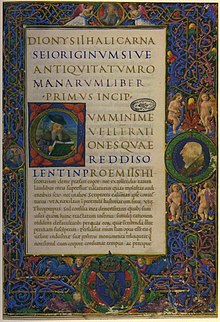Dionysius of Halicarnassus


Dionysius of Halicarnassus (Greek Διονύσιος Ἁλικαρνασσεύς Dionysius Halikarnasseús , Latin Dionysius Halicarnassensis * in about 54 BC.. Halicarnassus ;.. † after 7 BC in Rome ) was an ancient Greek- orator , writer and historian .
He came as a contemporary of Augustus in 29 BC. Chr. To Rome and wrote there for several journals, including his major work, a history of Rome (Greek Ῥωμαϊκὴ Ἀρχαιολογία, Rômaïkề Archaiologia, Latin Antiquitates Romanae (Roman Antiquities), so mutatis mutandis about Roman early history ) from its beginnings to the start of the First Punic War in twenty books, of which the first ten books are completely preserved, the eleventh book has survived in parts and fragments also exist in Konstantinos Porphyrogennetos and many other authors. In it he tried to portray the Roman and Greek origins as strongly linked; In addition, the history of the city of Rome (presented as an ideal polis) is interpreted teleologically , that is, reasons for the (idealized) rise of Rome to the "center of the world" are given retrospectively in the sense of the imperial Augustan political view - not least because of this the work is also used by many later authors from the imperial era, including Plutarch , Appian and Cassius Dio .
Despite these accompanying circumstances, which must be considered, the work is to be regarded as one of the most important sources for historical studies for the period from the Gallic invasion of Italy to the first Punic War (books XIV to XX), not least because other sources are lacking for many areas.
In addition to his work as a historian, Dionysius is primarily to be seen as a rhetorician , as which he is often exclusively classified by modern historians because of his theses on the Greek origins of Rome. Among other things, he wrote a treatise on the arrangement of words (Greek Περὶ Συνθέσεως Ὀνομάτων, Perì synthéseôs onomátôn, Latin De compositione verborum ), as well as an essay on ancient (especially Attic) speakers, their style and imitation ἈΚχσ Ἀρσνω (Greek Τῶραίων Tỗn archaíôn krísis ) a rhetoric (Greek Τέχνη Ῥητορική, Téchnê rhêtorikế ) as well as a few short assessments of previous Greek authors. A treatise on the eloquence of Demosthenes has also come down to us about him . In his later works he dealt more with formal aspects of speech and in the leading argument among rhetoricians of his time can generally be described as a strong advocate of atticism as opposed to Asianism .
Text editions and translations
- Karl Jacoby , Hermann Usener , Ludwig Radermacher (eds.): Dionysii Halicarnasei quae extant . Six volumes and supplement volume. Teubner, Leipzig 1885–1929 (critical complete edition).
- Earnest Cary (Ed.): The Roman Antiquities of Dionysius of Halicarnassus ( Loeb Classical Library ). 7 volumes, New Haven 1937–1950 (Greek text and English translation)
- Nicolas Wiater (translator): Dionysius von Halikarnass: Roman early history. Anton Hiersemann, Stuttgart 2014 ff., ISBN 978-3-7772-1403-0 (German translation).
- Volume 1: Books 1 to 3 (= Library of Greek Literature . Volume 75). 2014, ISBN 978-3-7772-1404-7 .
- Volume 2: Books 4 to 6 (= Library of Greek Literature. Volume 85). 2018, ISBN 978-3-7772-1803-8 .
-
Denys d'Halicarnasse: Antiquités Romaines. Les Belles Lettres, Paris 1998 ff. (Critical edition with French translation and commentary)
- Volume 1: Introduction générale et Livre I , ed. by Valérie Fromentin, 1998, ISBN 2-251-00467-X
- Volume 3: Livre III , ed. by Jacques-Hubert Sautel, 1999, ISBN 2-251-00477-7
- Volume 6: Livre VI , ed. by Jacques-Hubert Sautel, 2016, ISBN 978-2-251-00606-2
literature
- Eduard Schwartz : Dionysios 113. In: Paulys Realencyclopadie der classischen Antiquity Science (RE). Volume V, 1, Stuttgart 1903, Col. 934-961.
- Robert JH Shutt: Dionysius of Halicarnassus. In: Greece & Rome , Volume 4, Number 12, 1935, pp. 139-150.
- H. Hill: Dionysius of Halicarnassus and the Origins of Rome. In: The Journal of Roman Studies , Volume 51, 1961, pp. 88-93.
- Emilio Gabba: La 'Storia di Roma arcaica' di Dionigi d'Alicarnasso. In: Rise and Fall of the Roman World , Volume II.30.1, de Gruyter, Berlin 1982, ISBN 3-11-008469-4 , pp. 799–816.
- André Hurst: Un critique grec dans la Rome d'Auguste: Denys d'Halicarnasse. In: Rise and Fall of the Roman World , Volume II.30.1, de Gruyter, Berlin 1982, ISBN 3-11-008469-4 , pp. 839–865.
- Emilio Gabba: Dionysios and the History of Archaic Rome. University of California Press, Berkeley 1991, ISBN 978-0-520-07302-9 .
- Valérie Fromentin: Denys d'Halicarnasse, historien grec de Rome. In: Jean Leclant, François Chamoux (eds.): Histoire et historiographie dans l'antiquité. Actes du XIème colloque de la Villa Kerylos à Beaulieu-sur-Mer (= Cahiers de la Villa Kérylos. Volume 11). Académie des Inscriptions et Belles-Lettres, Paris 2001, ISBN 2-877-54124-X , pp. 123-142.
- Sotera Fornaro: Dionysius of Halicarnassus. In: The New Pauly (DNP). Volume 12/1, Metzler, Stuttgart 2002, ISBN 3-476-01482-7 , Sp. 635-638.
- Anouk Delcourt: Lecture des Antiquités romaines de Denys d'Halicarnasse. Un historien entre deux mondes. Académie Royale de Belgique, Brussels 2005, ISBN 2-8031-0214-5 .
- Anne Pinkepank: Dionysius of Halicarnassus. In: Manfred Landfester (ed.): History of ancient texts. Lexicon of authors and works (= Der Neue Pauly . Supplements. Volume 2). Metzler, Stuttgart / Weimar 2007, ISBN 978-3-476-02030-7 , pp. 215-218.
Web links
- Literature by and about Dionysius of Halicarnassus in the catalog of the German National Library
- Works by and about Dionysius of Halicarnassus in the German Digital Library
- English translation of the Roman Antiquities by LacusCurtius
| personal data | |
|---|---|
| SURNAME | Dionysius of Halicarnassus |
| ALTERNATIVE NAMES | Dionysius of Halicarnassus |
| BRIEF DESCRIPTION | Rhetor and author of early Roman history up to the beginning of the first Punic War |
| DATE OF BIRTH | around 54 BC Chr. |
| PLACE OF BIRTH | Halicarnassus |
| DATE OF DEATH | at 8 |
| Place of death | Halicarnassus |